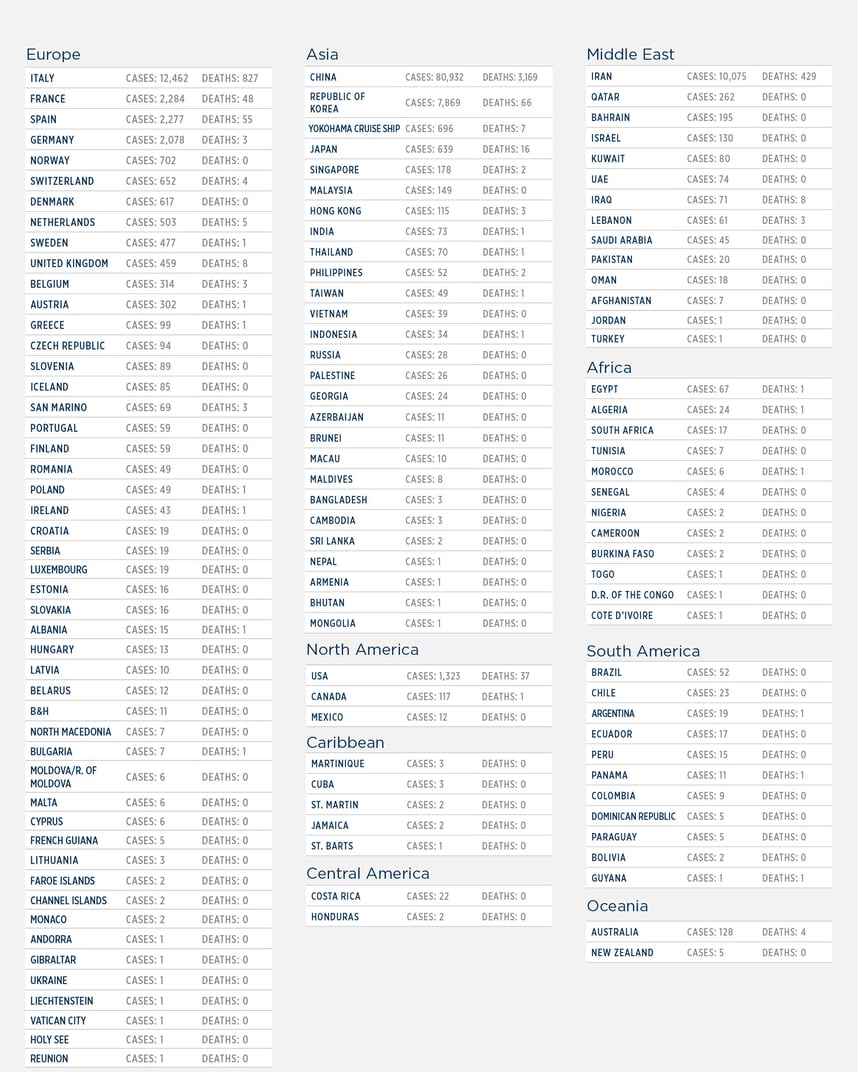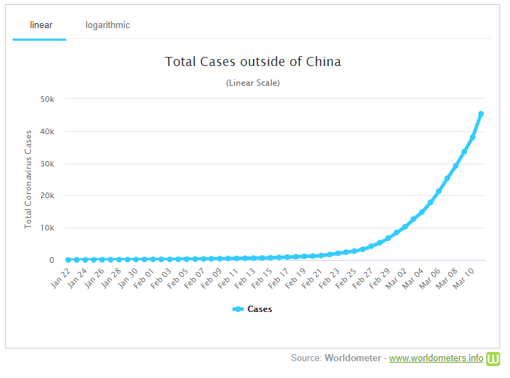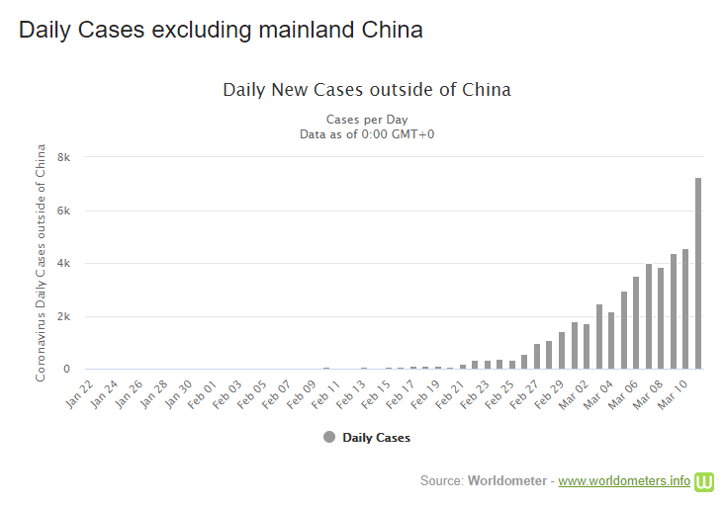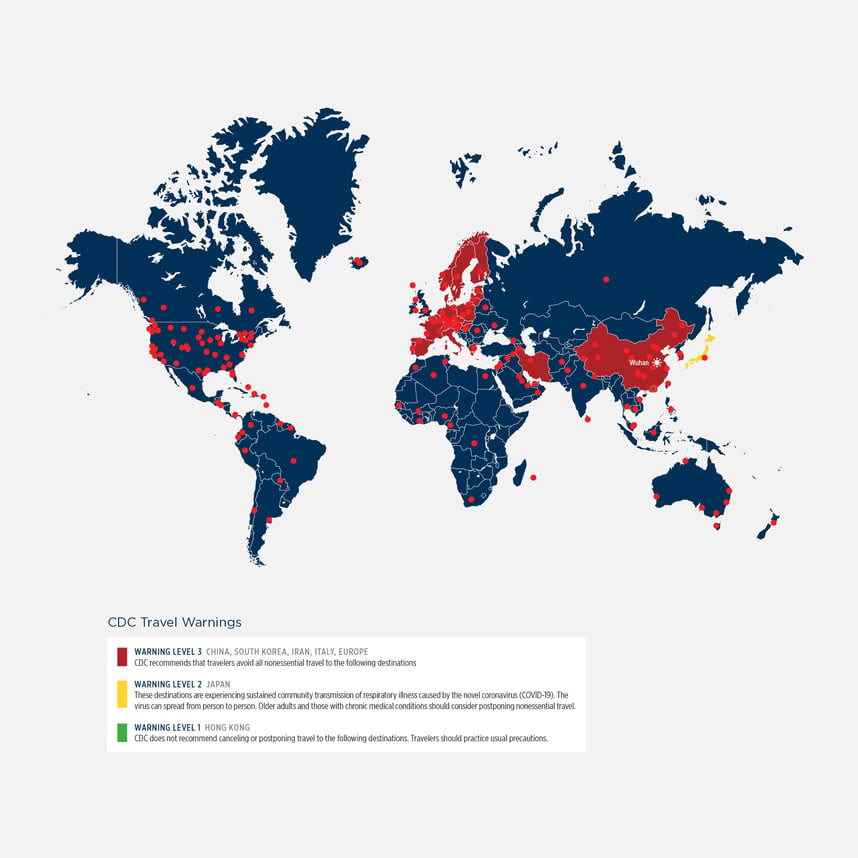On 11 March, President Trump announced new measures as part of the U.S response to the COVID-19 pandemic.
Effective 13 March at 11:59PM EST, any foreign nationals who had traveled to continental Europe in the last 14 days will not be allowed to enter the U.S. These countries include Austria, Belgium, Czech Republic, Denmark, Estonia, Finland, France, Germany, Greece, Hungary, Iceland, Italy, Latvia, Liechtenstein, Lithuania, Luxembourg, Malta, Netherlands, Norway, Poland, Portugal, Slovakia, Slovenia, Spain, Sweden, and Switzerland. This rule will be in effect for 30 days.
Exemptions:
- U.S. citizens and their immediate family
- Legal permanent residents of the U.S.
- Cargo and freight shipments
- The UK and Ireland are exempt from this proclamation
In addition to the executive order, the U.S. CDC issued a Level 3: Avoid Non-Essential Travel warning for the same European countries. Similarly, the U.S. State Department issued a Level 3: Global Health Advisory, urging all Americans to reconsider travel abroad due to the COVID-19 pandemic.
More countries have instituted travel bans in recent days:
In Kuwait, all commercial flights will be halted from 13 March; however, cargo flights will continue. There will be limited inbound flights for Kuwaiti citizens. Foreign nationals in Kuwait should contact their embassy for information on options to depart Kuwait. Kuwait has also announced that all malls, restaurants, and cafes, will be closing through the end of the month.
In Lebanon, the government announced that all travel to and from Italy, South Korea, China and Iran is suspended until further notice due the novel coronavirus (COVID-19) outbreak. Travelers arriving from France, Egypt, Syria, Iraq, Spain, the UK and Germany will also be banned entry; Lebanese nationals have four days to repatriate from these countries.
In Israel, foreign nationals upon entry will need to prove they have somewhere in the country to self-quarantine to be granted entry. Hotels may refuse to honor reservations for individuals in quarantine.
The Israeli Population and Immigration Authority will deny entry to any person who is not an Israeli resident or citizen who has traveled in the last 14 days to:
- China, South Korea, Italy, Iran, Iraq, Syria, and Lebanon (applies to connecting flights in these locations)
- Thailand, Hong Kong, Singapore, Macau, Japan, France, Germany, Switzerland, Spain, Austria, San Marino, Andorra, and Egypt (does not apply to connecting flights in these locations if you did not leave the airport)
- Any traveler in the last 14 days who attended any gatherings of more than 100 people or an international conference.
The Indian government announced that it is suspending all entry visas, effective 13 March through 15 April. There are exceptions for diplomatic, official, United Nations and work visas.
What we know:
- 129,822 confirmed cases worldwide
- 4,751 deaths
- 68,672 recovered
- Major spread areas are now in Iran, Italy, and South Korea. Continental Europe is the next "hot zone" for community transmission.
CURRENT STATUS
Countries around the world are starting to take serious steps to combat the spread of COVID-19. These range from full shutdown of airports, suspension of sports leagues, and cancelling of school to the total lockdown of outbreak cluster zones.
As COVID-19 spreads, more and more countries will institute travel restrictions both externally and internally. These policies are changing constantly as the pandemic evolves. The International Air Transport Association maintains a list of airline travel restrictions.

TRAVEL ADVICE
The U.S. State Dept. has issued Level 3: Reconsider Travel guidance for the entire world amid the COVID-19 pandemic. In addition, Global Guardian recommends the following:
- Avoid all travel to mainland China, Iran, Italy, South Korea, Kuwait, Lebanon, and Israel due to outbreaks and travel restrictions.
- Reconsider all travel to continental Europe and the APAC region.
- Reconsider all non-essential travel to the rest of the world.
- Do not go on a cruise. Several cruise lines have already canceled all planned cruises.
- Practice advanced careful hygiene measures, including frequent hand washing and sanitizing.
- Practice "social distancing" while in public spaces.
OUTLOOK
The experience in Italy may serve as a glimpse of what is to come in the rest of Europe and eventually the U.S. if the virus continues to spread. The U.S. and Europe need to be prepared for significant strain on healthcare resources in the coming months.
See below graphs from Worldometers highlighting rapid growth of cases outside China:


Support
Global Guardian is closely monitoring the situation. To request additional support or learn more about pricing on customized daily, weekly, or monthly intelligence reports tailored to your organization’s interests, please reach out to our security analysts by clicking below.





